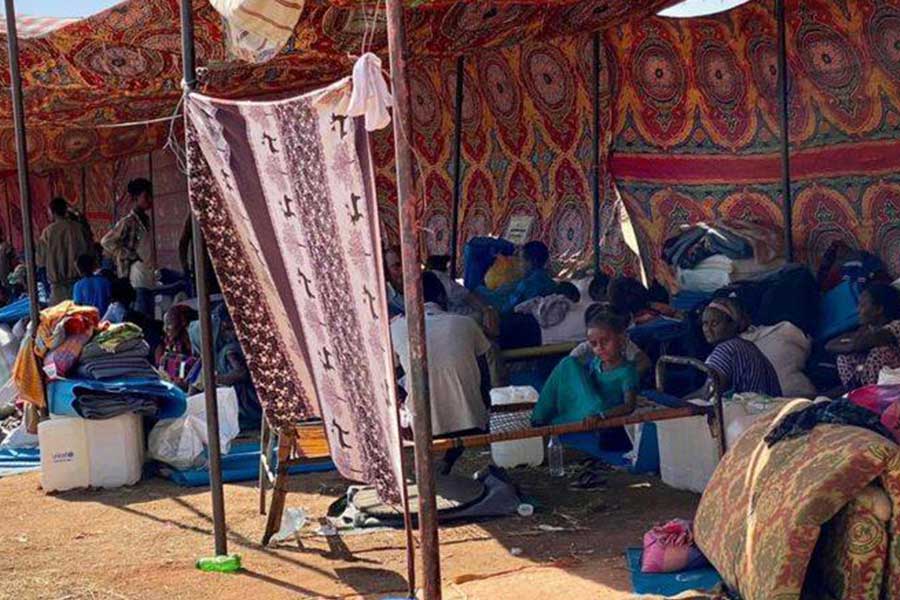
Jun 15 , 2024
By Hintsa Andebrhan
Three weeks ago, former President Donald Trump expressed concerns about the possibility of left-wing hardliners in Washington reimposing COVID-19 lockdowns, warning Americans of scheduled orders that could disrupt daily life once again. Given the potential ramifications of another COVID-19 outbreak or any pandemic on the global economic and political landscape, it would be unwito dismiss Trump's apprehensions easilyons. The concerns of a prominent political figure like Trump should not be overlooked.
The COVID-19 pandemic, which has claimed over seven million lives worldwide, proved to be a profitable venture for some individuals and pharmaceutical companies. This context should give weight to Trump’s claims. It is not merely a product of political rivalry but a reflection of the powerful financial interests at play. Undoubtedly, Trump’s allegations may serve his political ambitions, but they also touch on indisputable facts.
Bill Gates, renowned for his software empire and philanthropic efforts through the Bill & Melinda Gates Foundation, was at the forefront of addressing the COVID-19 crisis. His Foundation invested billions in epidemiological research, developing strategies to combat the virus. Gates' collaboration with the World Health Organization (WHO) was instrumental in shaping global responses to the pandemic and guiding patient management and disease prevention efforts.
Investigations by POLITICO and Die Welt have uncovered the influential roles of organisations like Gavi, the Vaccine Alliance, and the Coalition for Epidemic Preparedness Innovations (CEPI). These entities, heavily funded by the Gates Foundation, have greatly influenced global health response policies and decisions during the pandemic. Their involvement proved the profound impact well-organised, privately funded institutions can have on public health strategies.
Gates sent a copy of his book, "How to Prevent the Next Pandemic," to WHO Director-General Tedros A. Ghebreyesus in April 2022. Tedros acknowledged the gesture, stressing the need to learn from the COVID-19 pandemic to better prepare for future outbreaks. Gates’ focus on the next potential pandemic raises questions about the likelihood of returning to lockdown scenarios for unknown diseases.
POLITICO and Die Welt’s investigations, which examined thousands of financial disclosures and tax documents, revealed that institutions funded by the Gates Foundation have spent nearly 10 billion dollars since 2020. Gates has consistently advocated for the mass production of vaccines, securing funding, and developing distribution systems to combat pandemics effectively. His Foundation’s deals with 16 pharmaceutical companies were to ensure equitable access to COVID-19 vaccines worldwide.
One of these companies, Johnson & Johnson, provided 1.2 million doses of its COVID-19 vaccine to Ethiopia in August 2021 as part of a donation from the United States. However, the Johnson & Johnson vaccine had faced scrutiny. The U.S. suspended its use three months earlier due to reports of blood clots, and the European Medicines Agency later found it could cause neurodegenerative disease, leading to a ban in Europe.
Despite these concerns, Ethiopia accepted the donation. The decision should have raised pressing questions about the Ethiopian government's policies.
Why did Ethiopia accept a vaccine with known health risks? What has been the impact on the population?
There is no data on the number of Ethiopians who may have been affected by taking the Johnson & Johnson vaccine. A global pharmaceutical giant, Johnson & Johnson conducts extensive testing to ensure the safety and efficacy of its products. However, despite its questionable safety records, the Ethiopian government’s acceptance of the vaccine should urge more stringent evaluation and oversight.
As Trump speculates about potential future lockdowns, it is crucial to consider the Ethiopian government’s approach to pandemic preparedness. The revelations should prompt a reflection of his warnings. If these powerful organisations can overshadow government and WHO policies, it is worth considering the implications of their influence.
What measures will the Abiy administration take to protect the population from vaccination errors?
Mekdes Daba (MD), minister of Health, faces the formidable task of ensuring that past mistakes are not repeated and that public health policies prioritise the safety and well-being of Ethiopians.
PUBLISHED ON
Jun 15,2024 [ VOL
25 , NO
1259]


Fortune News | Nov 21,2020

Commentaries | Jan 31,2021

Commentaries | May 25,2019

Viewpoints | Sep 28,2024

Editorial | Oct 15,2022

Editorial | Sep 26,2021

Viewpoints | Jan 04,2020

Fineline | Jul 20,2019

View From Arada | Sep 03,2022

Radar | May 07,2022

My Opinion | 132151 Views | Aug 14,2021

My Opinion | 128561 Views | Aug 21,2021

My Opinion | 126482 Views | Sep 10,2021

My Opinion | 124091 Views | Aug 07,2021





Dec 22 , 2024 . By TIZITA SHEWAFERAW
Charged with transforming colossal state-owned enterprises into modern and competitiv...

Aug 18 , 2024 . By AKSAH ITALO
Although predictable Yonas Zerihun's job in the ride-hailing service is not immune to...

Jul 28 , 2024 . By TIZITA SHEWAFERAW
Unhabitual, perhaps too many, Samuel Gebreyohannes, 38, used to occasionally enjoy a couple of beers at breakfast. However, he recently swit...

Jul 13 , 2024 . By AKSAH ITALO
Investors who rely on tractors, trucks, and field vehicles for commuting, transporting commodities, and f...

Jul 12 , 2025
Political leaders and their policy advisors often promise great leaps forward, yet th...

Jul 5 , 2025
Six years ago, Ethiopia was the darling of international liberal commentators. A year...

Jun 28 , 2025
Meseret Damtie, the assertive auditor general, has never been shy about naming names...

Jun 21 , 2025
A well-worn adage says, “Budget is not destiny, but it is direction.” Examining t...

Jul 13 , 2025 . By YITBAREK GETACHEW
The Addis Abeba City Revenue Bureau has introduced a new directive set to reshape how...

Jul 13 , 2025 . By BEZAWIT HULUAGER
Addis Abeba has approved a record 350 billion Br budget for the 2025/26 fiscal year,...

Jul 13 , 2025 . By RUTH BERHANU
The Addis Abeba Revenue Bureau has scrapped a value-added tax (VAT) on unprocessed ve...

Jul 13 , 2025 . By NAHOM AYELE
Federal lawmakers have finally brought closure to a protracted and contentious tax de...